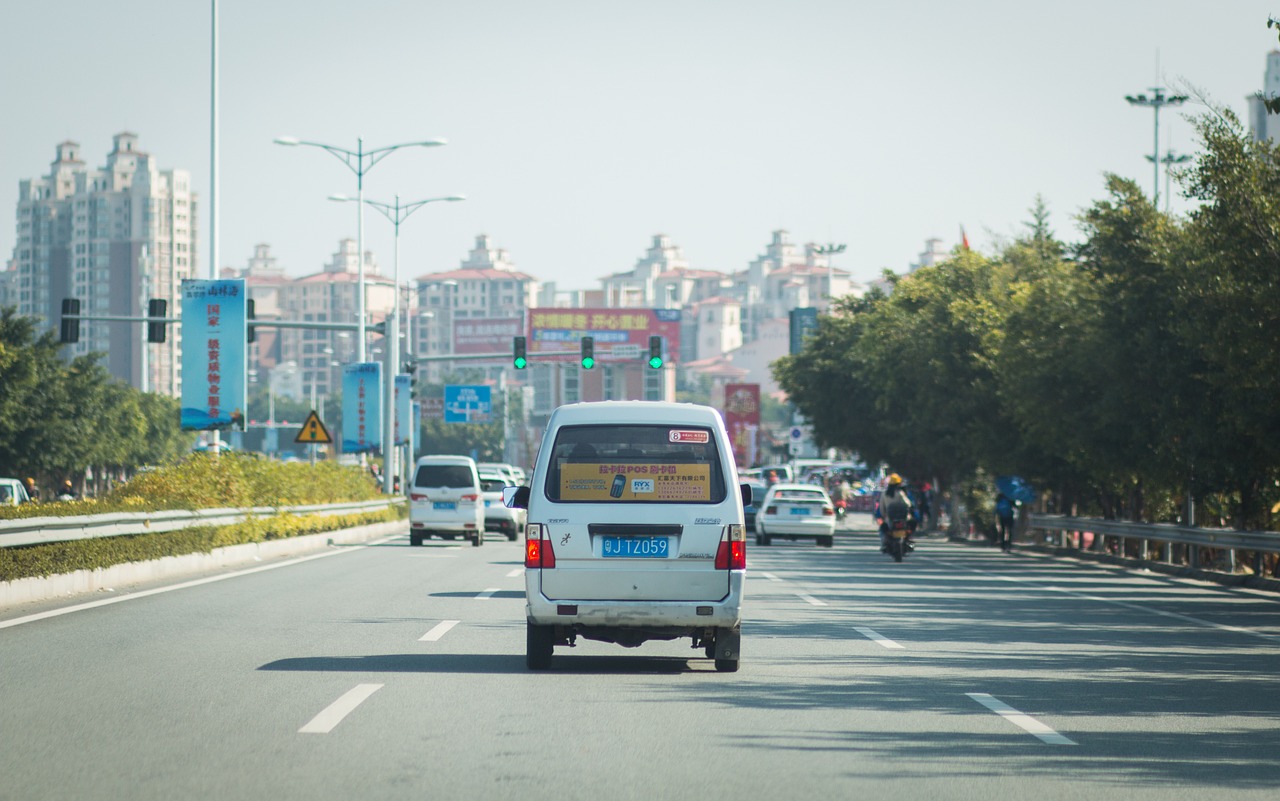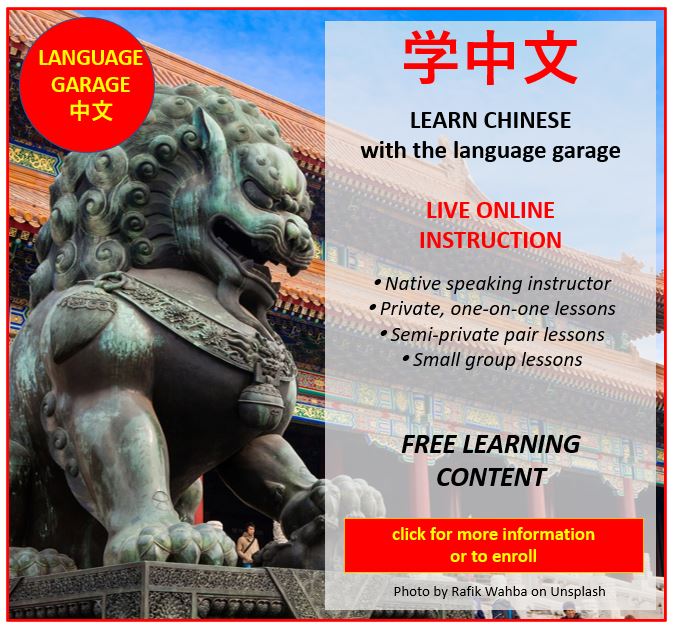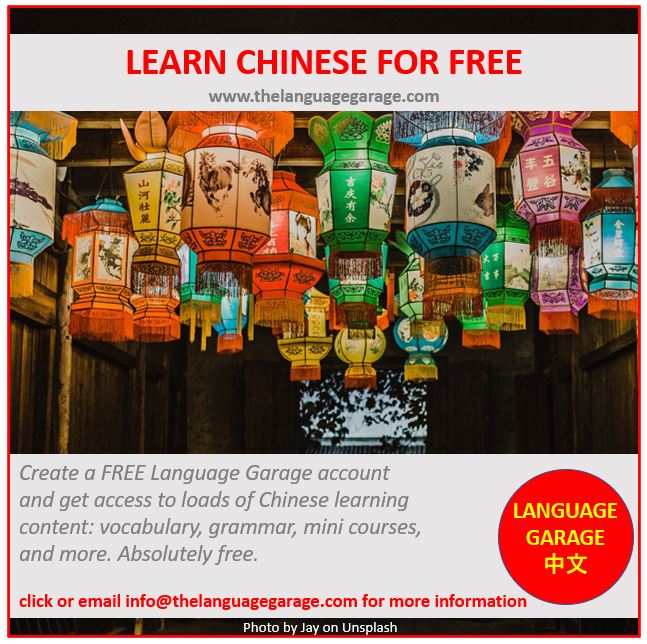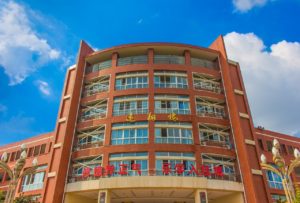In this post we’ll look at some Chinese vocabulary related to cars and driving.
我的车 wǒ de chē: My car
Let’s start with some basic vocabulary: 车 chē (car), 驾车 jiàchē (to drive), 汽油 qìyóu (gas/petrol), 加油 jiāyóu (to get gas), 加满油箱 jiā mǎn yóuxiāng (to fill the gas tank), 安全带 ānquán dài (seatbelt), 车库 chēkù (garage), 启动汽车 qǐdòng qìchē (to start the car), 停车 tíngchē (to park the car), 停车场 tíngchē chǎng (parking lot), 停车位 tíngchē wèi (parking space), 关闭引擎 guānbì yǐnqíng (to turn off the engine).
- 你有车吗?
Nǐ yǒu chē ma?
Do you have a car? - 我买了一辆新车。
Wǒ mǎile yī liàng xīnchē.
I bought a new car. - 我每周开车很多次。
Wǒ měi zhōu kāichē hěnduō cì.
I drive a lot every week. - 系好安全带。
Xì hǎo ānquán dài.
Put on your seatbelt. - 我需要加油。
Wǒ xūyào jiāyóu.
I need to get gas. - 请加满油箱。
Qǐng jiā mǎn yóuxiāng.
Fill the tank, please. - 你把车停在车库里还是街上?
Nǐ bǎ chē tíng zài chēkù lǐ háishì jiē shàng?
Do you park in a garage or on the street? - 我找不到停车位。
Wǒ zhǎo bù dào tíngchē wèi.
I can’t find a parking space.
打开车门! Dǎkāi chēmén! Unlock the car door!
Now let’s look at some vocabulary for parts of a car. 车门 chēmén (car door), 挡风玻璃 dǎng fēng bōlí (windshield), 挡风玻璃刮水器 dǎng fēng bōlí guā shuǐ qì (windshield wipers), 升起/降下窗户 shēng qǐ/jiàngxià chuānghù (to put up/down the window), 后备箱 hòubèi xiāng (trunk/boot), 引擎盖 yǐnqíng gài (hood/bonnet), 方向盘 fāngxiàngpán (steering wheel), 前座 qiánzuò (front seat), 后座 hòu zuò (back seat),头灯 tóu dēng (headlights), 刹车 shāchē (brakes), 引擎 yǐnqíng (engine), 闪烁灯 shǎnshuò dēng (blinker, turn signal), 刹车灯 shāchē dēng (brake lights), 换油 huàn yóu (to change the oil), 机械 jīxiè (mechanic).
- 手提箱在后备箱里。
Shǒutí xiāng zài hòubèi xiāng lǐ.
The suitcases are in the trunk. - 孩子们坐在后座上。
Háizimen zuò zài hòu zuò shàng.
The kids are sitting in the back seat. - 是冷的!装上窗户,打开暖气。
Shì lěng de! Zhuāng shàng chuānghù dǎkāi nuǎnqì.
It’s cold! Put up the windows and turn on the heat. - 很热!打开窗户或打开空调。
Hěn rè! Dǎkāi chuānghù huò dǎkāi kōng tiáo.
It’s hot! Open the windows or put the air conditioning on. - 下雨了。我需要装上挡风玻璃刮水器。
Xià yǔle. Wǒ xūyào zhuāng shàng dǎng fēng bōlí guā shuǐ qì.
It’s raining. I need to put on the windshield wipers. - 这是黑暗的。我需要打开头灯。
Zhè shì hēi’àn de. Wǒ xūyào dǎkāi tóu dēng.
It’s dark. I need to put on the headlights. - 发动机在引擎盖下。
Fādòngjī zài yǐnqíng gài xià.
The engine is under the hood. - 我的车需要新的刹车。
Wǒ de chē xūyào xīn de shāchē.
My car needs new brakes. - 戴上转向灯,然后在下一条街道转弯。
Dài shàng zhuǎnxiàng dēng, ránhòu zàixià yītiáo jiēdào zhuǎnwān.
Put on your blinker (turn signal) and turn at the next street. - 我需要换我车里的机油。
Wǒ xūyào huàn wǒ chē lǐ de jīyóu.
I need to change the oil in my car. - 我的车出了点问题。我需要一个机械师。
Wǒ de chē chūle diǎn wèntí. Wǒ xūyào yí gè jīxiè shī.
Something is wrong with my car. I need a mechanic.
在红绿灯处右转。 Zài hónglǜdēng chù yòu zhuǎn. Turn right at the traffic light.
Now let’s see some vocabulary that describes what we do when we drive. 直行 zhíxíng (to drive straight), 左转/右转 zuǒ zhuǎn/yòu zhuǎn (to turn left/right), 扭转 niǔzhuǎn (to reverse), 换档 huàn dǎng (to change gears), 红绿灯 hónglǜdēng (traffic light), 停止标志 tíngzhǐ biāozhì (stop sign), 速度极限 sùdù jíxiàn (speed limit), 按喇叭 àn lǎbā (to honk the horn).
- 你开得太快了。慢一点!
Nǐ kāi dé tài kuàile. Màn yīdiǎn!
You’re driving too fast. Slow down! - 你开得太慢了。加速!
Nǐ kāi dé tài mànle. Jiāsù!
You’re driving too slowly. Speed up! - 速度极限是多少?
Sùdù jíxiàn shì duōshǎo?
What is the speed limit? - 在下一个红绿灯左转。
Zàixià yī gè hónglǜdēng zuǒ zhuǎn.
Turn left at the next traffic light. - 有停车标志!停止!
Yǒu tíngchē biāozhì! Tíngzhǐ!
There’s a stop sign! Stop! - 他为什么要按喇叭?
Tā wèishéme yào àn lǎbā?
Why is he honking his horn? - 她倒车出了停车位,开走了。
Tā dàochē chūle tíngchē wèi, kāi zǒule.
She reversed out of the parking spot and drove away.
在路上 Zài lùshàng: On the road
Now let’s look at some things you’re likely to see when you’re on the road. 街道 jiēdào (street), 高速公路 gāosù gōnglù (highway), 高速公路出口 gāosù gōnglù chūkǒu (highway exit), 上高速公路 shàng gāosù gōnglù (to get on the highway), 收费站 shōufèi zhàn (toll booth), 桥 qiáo (bridge), 路标 lùbiāo (road sign), 环岛 huándǎo (traffic circle/roundabout), 卡车 kǎchē (truck), 通过汽车 tōngguò qìchē (to pass a car), 车道 chēdào (lane), 加油站 jiāyóu zhàn (gas station), 交通阻塞 jiāotōng zǔsè (traffic jam), 花一小时/两小时开车到 X huā yī xiǎoshí/liǎng xiǎoshí kāi chē dào X (to take one hour/two hours to drive to X.)
- 我怎么去高速公路?
Wǒ zěnme qù gāosù gōnglù?
How do I get to the highway? - 在下一个出口离开高速公路。
Zàixià yī gè chūkǒu líkāi gāosù gōnglù.
Get off the highway at the next exit. - 过桥后有一个收费站。
Guò qiáo hòu yǒu yī gè shōufèi zhàn.
There’s a toll booth after the bridge. - 那个牌子上写的是什么?
Nàgè páizi shàng xiě de shì shénme?
What does it say on that sign? - 最近的加油站在哪里?
Zuìjìn de jiāyóu zhàn zài nǎlǐ?
Where is the nearest gas station? - 这辆车开得很慢。让我们通过它。
Zhè liàng chē kāi dé hěn màn. Ràng wǒmen tōngguò tā.
This car is driving very slowly. Let’s pass it. - 先不要变道,后面有一辆卡车。
Xiān bùyào biàn dào, hòumiàn yǒuyī liàng kǎchē.
Don’t change lanes yet, there’s a truck behind you. - 一天中的这个时候交通真的很糟糕。
Yītiān zhōng de zhège shíhòu jiāotōng zhēn de hěn zāogāo.
Traffic is really bad this time of day. - 我们遇到了交通堵塞。
Wǒmen yù dàole jiāotōng dǔsè.
We’re stuck in a traffic jam. - 开车到机场需要多长时间?
Kāichē dào jīchǎng xūyào duō cháng shíjiān?
How long does it take to drive to the airport?
我有一只轮胎瘪了。 Wǒ yǒuyī zhī lúntāi biěle. I have a flat tire.
Sometimes things don’t always go perfectly well when we drive. 转错弯 zhuǎn cuò wān (to make a wrong turn), 丢失 diūshī (to be lost), 瘪的轮胎 biě de lúntāi (a flat tire), 没油了 méi yóule (to be out of gas), 发生意外 fāshēng yìwài (to have an accident), 猛踩刹车 měng cǎi shāchē (to slam on the brakes), 转向 zhuǎnxiàng (to swerve), 滑动 huádòng (to slide), 打滑 dǎhuá (to skid), 没电的电池 méi diàn de diànchí (a dead battery), 撞树/另一辆车 zhuàng shù/lìng yī liàng chē (to hit a tree/another car), 得到一张票 dédào yī zhāng piào (to get a ticket).
- 我转错了。输了。
Wǒ zhuǎn cuòle. Shūle.
I made a wrong turn. We’re lost. - 我们的轮胎漏气了。
Wǒmen de lúntāi lòu qìle.
We have a flat tire. - 我们发生了一起小事故。
Wǒmen fāshēngle yīqǐ xiǎo shìgù.
We had a minor accident. - 我前面的司机猛踩刹车。
Wǒ qiánmiàn de sījī měng cǎi shāchē.
The driver ahead of me slammed on his/her brakes. - 一条狗跑到马路上,我转身避开它。
Yītiáo gǒu pǎo dào mǎlùshàng, wǒ zhuǎnshēn bì kāi tā.
A dog ran into the road, and I swerved to avoid it. - 路上结冰了,所以车子在打滑。
Lù shàng jié bīngle, suǒyǐ chēzi zài dǎhuá.
The roads are icy, so the car is sliding. - 我们打滑停下来。
Wǒmen dǎhuá tíng xiàlái.
We skidded to a stop. - 汽车发动不起来。电池没电了。
Qìchē fādòng bù qǐlái. Diànchí méi diànle.
The car won’t start. The battery is dead. - 我撞到一棵树/另一辆车。
Wǒ zhuàng dào yī kē shù/lìng yī liàng chē.
I hit a tree/another car. - 我超速并得到了一张罚单。
Wǒ chāosù bìng dédàole yī zhāng fádān.
I was speeding and got a ticket.
出租车! Chūzūchē! Taxi!
Here are some vocabulary items and expressions that you can use for public transportation. 出租车 chūzūchē (taxi), 公共汽车 gōnggòng qìchē (bus), 票价 piào jià (fare), 的士站 dí shì zhàn (taxi stand), 巴士站 bāshì zhàn (bus stop), 上车 shàng chē (to get on the bus), 下车 xià chē (to get off the bus).
- 我在哪里可以打到出租车?
Wǒ zài nǎlǐ kěyǐ dǎ dào chūzūchē?
Where can I get a taxi? - 我想去火车站,拜托。
Wǒ xiǎng qù huǒchē zhàn, bàituō.
I would like to go to the train station, please. - 请带我到这个地址。
Qǐng dài wǒ dào zhège dìzhǐ.
Please take me to this address. - 费用多少?
Fèiyòng duōshǎo?
How much is the fare? - 请停在这里。
Qǐng tíng zài zhèlǐ.
Please stop here. - 从机场到市中心有巴士吗?
Cóng jīchǎng dào shì zhōngxīn yǒu bāshì ma?
Is there a bus from the airport to the city center? - 我们在下一站下车。
Wǒmen zàixià yí zhàn xià chē.
We get off at the next stop.
我可以在哪里租车? Wǒ kěyǐ zài nǎlǐ zū chē? Where can I rent a car?
Let’s close with some vocabulary and expressions that you can use when renting a car. 租车 zū chē (to rent a car), 两门,四门 liǎng mén, sì mén (two-door, four-door), 四轮驱动 sì lún qūdòng (four-wheel drive), 自动变速器 zìdòng biànsùqì (automatic transmission), 手动变速器 shǒudòng biànsùqì (manual transmission), 保险 bǎoxiǎn (insurance), 驾照 jiàzhào (driver’s license), 去取车 qù qǔ chē (to pick up the car), 还车 hái chē (to return the car), 里程/公里限制 lǐchéng/gōnglǐ xiànzhì (mileage/kilometrage limit).
- 我们想租一辆车。
Wǒmen xiǎng zū yī liàng chē.
We would like to rent a car. - 我们想要一辆两门/四门车。
Wǒmen xiǎng yào yī liàng liǎng mén/sì mén chē.
We would like a two-door/four-door car please. - 我们需要一辆四轮驱动的汽车。
Wǒmen xūyào yī liàng sì lún qūdòng de qìchē.
We need a four-wheel drive vehicle. - 你喜欢自动变速箱还是手动变速箱?
Nǐ xǐhuān zìdòng biànsù xiāng háishì shǒudòng biànsù xiāng?
Do you prefer automatic or manual transmission? - 这是我的驾照。
Zhè shì wǒ de jiàzhào.
Here is my driver’s license. - 包括多少保险?
Bāokuò duōshǎo bǎoxiǎn?
How much insurance is included? - 每天的里程/公里限制是多少?
Měitiān de lǐchéng/gōnglǐ xiànzhì shì duōshǎo?
What is the daily mileage/kilometrage limit? - 我可以在机场取车/还车吗?
Wǒ kěyǐ zài jīchǎng qǔ chē/hái chē ma?
Can I pick up/return the car at the airport?
Do you want to learn Chinese?
Check out our other posts on Chinese language, culture, and more. And if you’re looking for convenient and affordable live Chinese lessons with a real teacher, check out The Language Garage. Our lessons are given online in a virtual classroom, so it doesn’t matter where you live or work – we can come to you. And we have flexible options, with a free trial so that you can decide if there’s a fit. Check us out!






